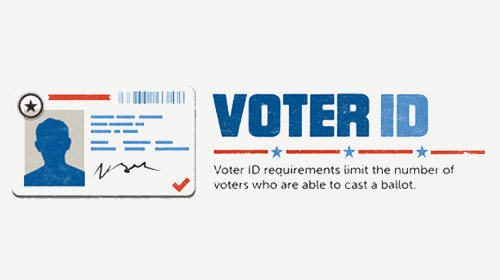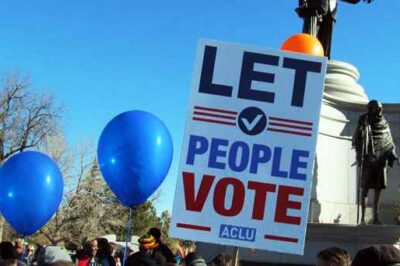
Wednesday marked the third day of witness testimony in the challenge to the state’s voter ID law brought by the ACLU of Pennsylvania, the Public Interest Law Center of Philadelphia,Advancement Project, and the law firm of Arnold & Porter. It also marked a shift from statistical analysis to the beginning of testimony regarding the accessibility of the identification required for voting.
The first witness was David A. Marker, PhD, an expert in public policy surveys and statistics who works for Westat, a Maryland business that does large-scale statistical studies. (Dr. Marker’s report is available here.) Dr. Marker reviewed the methodology of a study conducted last year by a Dr. Barreto to determine the number of voters in Pennsylvania who do not have identification that would allow them to vote, and testified that it was conducted in accordance with all professional standards, and that he had full confidence in the results. Dr. Barreto concluded that the number of eligible voters in Pennsylvania without acceptable ID likely numbered over one million, and is definitely in the hundreds of thousands. (Dr. Barreto’s original report is available here.)
Dr. Marker testified that the study reliably showed that 1.2-1.5 million eligible voters were without proper identification and 900,000-1.2 million registered voters were without proper identification, either because they lacked ID completely or the name on the ID did not match that of the name they registered under. He also addressed several issues with the study that Judge Simpson had identified last year, testifying that even if the alleged flaws in the study were factored in, there would still be hundreds of thousands of Pennsylvanian voters without the required ID. For example, Judge Simpson criticized the fact that, because the study was conducted over 12 consecutive days in the summer, there was the possibility that a disproportionate number of non-responses were from people on vacation, and those who go on vacation for 12 straight days are likely to have higher incomes and thus more likely to have identification. Dr. Marker testified that, even assuming that everyone who was unreachable was on vacation, and that the rate of those lacking IDs was half that of the average, the estimate of eligible Pennsylvanians who do not have proper ID would only be reduced from 12.8% to 7.9%, which still leaves hundreds of thousands of disenfranchised people.
Needless to say, it is absurd to think that all, or even a substantial percentage, of the people who could not be reached were unavailable because they were on vacation. Similarly, Dr. Marker testified that even if we assume that no one whose name on their ID differs from their name in the voter registration is denied access to the polls for that reason, there would still be well over 500,000 voters who do not have the required ID.
Attorneys for the commonwealth identified other areas of concern during their cross-examination, trying to poke holes in the study’s conclusions. For example, defendant’s counsel Alicia Hickock brought up the possibility that asking people if they had “official” PennDOT identification might lead them to believe that the question referred to something more than their driver’s license or non-driving identification card, or that those who were on vacation were more likely to have a passport, which the study did not take into account. Ms. Hickock also pointed out that the study did not take into consideration the number of people who did not have identification but permanently used absentee ballots and would not be disenfranchised. However, on re-direct, Mr. Walczak demonstrated that only 15-18,000 voters fall into that category, which is negligible as compared to the hundreds of thousands of registered voters who do not have ID. Again, even if you assign far more weight than is reasonable to the factors objected to by the state and by Judge Simpson, the fact remains that hundreds of thousands of eligible and registered voters in Pennsylvania are disenfranchised by the voter ID law.
In one strange line of questioning, Ms. Hickock asked Dr. Marker if, given the fact that he testified that civically engaged, educated individuals were more likely to respond to surveys, there was a possibility that those who felt strongly about the voter ID law might have said they didn’t have ID when they did have it in order to express their feelings about the law. Dr. Marker responded that if the survey did reach a disproportionately educated, engaged part of the population, it would instead mean that those without IDs were under-represented in the survey – not over-represented.
The second witness of the day was Adam Bruckner, the founder of Philly Restart, the only nonprofit in Philadelphia dedicated to helping homeless persons pay to get IDs required for things such as employment and voting. His organization has unfortunately been forced to require a referral letter before providing assistance because the demand for their services so far exceeds what they can provide. Mr. Bruckner testified that he informed everyone who came to his agency that PennDOT ID was now free for those who needed it to vote. However, after many of those he sent to PennDOT to get this ID were turned away, he simply stopped making the announcement. Mr. Bruckner passionately testified about the great need for IDs in the homeless community, saying that the men and women he serves “care about voting because they care about life… Voting means a lot to them because it’s sometimes the only voice they have.”
The third and final witness of the day was Jonathan Marks, Commissioner of the Bureau of Commissions, Elections and Legislation with the Pennsylvania Department of State, who testified that he had complete confidence in the integrity of the elections held in Pennsylvania before the passage of the voter ID law, when voters only had to show identification the first time they voted in a particular precinct and sign a poll book when they voted, which poll workers then compared to the signature on file. Mr. Marks then testified about the details of the voter ID law, which requires that voters present one of a short list of IDs that does not include many common forms of identification, such as a IDs provided by the Department of Veteran’s Affairs.
The most common and accessible IDs on the list are from PennDOT, and getting one requires, among other things, going to a PennDOT office. Nine counties do not have an office and 22 have offices that are only open one or two days a week. Mr. Marks also testified that there have been fewer than 100 free non-driver’s photo IDs issued per month since November and less than 50 DOS IDs issued per month in that time, for a total of only 16,811 of these types of voting IDs issued since March of 2012, helping only a tiny fraction of the hundreds of thousands of Pennsylvanians without the necessary ID.
Mr. Marks began to testify about the surprisingly complex requirements of the new DOS ID, but ran out of time. His testimony will resume tomorrow morning at 9:30 am. Other witnesses set to testify tomorrow include Diana Mutz, a communications expert who will critique the state’s education campaign, and Shannon Royer, Deputy Secretary for External Affairs and Elections.
Learn more about voter ID and other civil liberties issues: Sign up for breaking news alerts, follow us on Twitter, and like us on Facebook.




